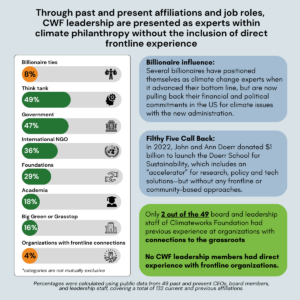 Recently, the news arm of a conservative trade association of grantmakers asked this question on Twitter: ” What’s more important in #philanthropy: #freedom or govt mandates,” posing it as a challenge to NCRP.
Recently, the news arm of a conservative trade association of grantmakers asked this question on Twitter: ” What’s more important in #philanthropy: #freedom or govt mandates,” posing it as a challenge to NCRP.
I’d like to push back and ask: Why is the mere act of asking what can be done better so threatening? What’s most important in philanthropy is impact and results that lead to stronger and more vibrant communities. And these “communities” are the communities we’re all a part of and care about, especially those that have been marginalized and underserved.
Perhaps I am too much of a perfectionist, but I believe that there’s always something we can do better, especially when being better could mean better quality of education for our children, more equitable opportunities for women and girls, more access to job opportunities and other improvements in the quality of life for many who are struggling. I also believe that you can’t get to “better” without being open to critical questions.
Below is the full introduction of the presentation given by Aaron Dorfman at a webinar hosted by the Southeastern Council on Foundations in December 2013. During the webinar, Aaron discussed how foundation leaders are increasingly facing tough questions – from themselves, from grantees and from lawmakers – about the good they are doing in society. He also offered suggestions for ways that foundations can practice high-impact philanthropy that maximizes the results from philanthropic dollars.
“Thank you, Dwayne, for that kind introduction. And thank you to Southeastern Council on Foundations for inviting me to present this webinar. It’s great to be here with you.
It’s no secret to anyone on this webinar that private philanthropy isn’t all that private anymore. To the extent that not in our sector think about foundations at all, many feel as though foundations are just a bunch of rich folks with special tax privileges who don’t want to help people who need it most.
- Members of Congress are paying attention to foundations, and asking more questions than they used to.
- The Senate Finance Committee is considering fundamental tax reform and is asking every industry that gets preferential tax treatment to justify itself.
- State legislatures and attorneys general in Oregon, New York, Massachusetts, Minnesota and other states are looking more closely at charities and foundations.
- Communities of color around the nation are asking why they receive such a small share of philanthropic dollars.
- Newspapers are looking for sensational stories, and they’re including nonprofits and foundations as possible subjects.
The public and many lawmakers want to have a say in private philanthropy. They think they have an interest in how foundations and charities operate. Now some of you on the webinar today probably think that’s a good thing, and some of you probably think it’s a bad thing. But it’s undeniable that foundations are being asked to justify themselves more now than ever before.
Part of the way we can respond to this new reality is that we can learn to tell better stories about how foundations are benefitting society. There are many great things happening in the world in part because of the important work of many of you on this webinar, and your colleagues at other foundations around the nation. We can certainly do a better job telling those stories, and I know your grantmaker association is committed to helping you do that. But we’re not going to focus on that today.
Instead, we’re going to focus on another important way we can respond to the new reality. We’re going to explore today what foundations can do to improve how they operate and how they help those who need it most. Research has shown that certain practices actually help foundations do more good with the resources they have. Certain approaches to grantmaking produce better results than other approaches. And so in addition to focusing on telling better stories, we also need to improve foundation practices so that we all have better stories to tell.”
There might be those who feel threatened by the mere act of being critical and asking what can be done better. But with such high stakes on the line, I am hopeful that we can get past the knee-jerk reaction and ask ourselves and each other: Is the philanthropic sector the best that it can be? What can we do better (and perhaps differently) as a community that will maximize the impact of our grantmaking, which will ultimately help foundations achieve their missions?
Want to learn more about grantmaking that produces better results? Here are some resources:
- Philanthropy’s Promise
- High Impact Strategies for Philanthropy
- Leveraging Limited Dollars
- Smashing Silos in Philanthropy
- NCRP Impact Awards
Yna C. Moore is communications director at the National Committee for Responsive Philanthropy (NCRP). Follow NCRP on Twitter (@ncrp).
































































































































































































































































































































































































































